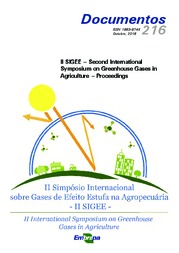Nitrous oxide (N2O) emissions from soil cultivated with grass Marandu and subjected to rates and sources of N fertilizers in Amazon of Mato Grosso.
Nitrous oxide (N2O) emissions from soil cultivated with grass Marandu and subjected to rates and sources of N fertilizers in Amazon of Mato Grosso.
Autoria: OLIVEIRA, M. O.; NASCIMENTO, A. F. do; PEDREIRA, B. C. e; PEREIRA, D. H.; RODRIGUES, R. de A. R.
Resumo: Nitrogen is the nutrient required for the fodder production, and main sources are urea and ammonium sulfate, with 45% and 24% of N, respectively. The application of nitrogen may greatly increase the production of forage since improves the availability of exchangeable N in soil. The minimum and maximum rate usually applied are 40 and 80 kg ha-1 of N (SOUZA et al., 2004).If on the one hand it promotes the growth of plants, on the other the nitrogen fertilization increases N2O emissions from soils. Hence, the increase in emissions because of this agricultural practice must be understood as it contributes to the increase in greenhouse gas concentrations in the atmosphere, which are related to climate changes (RODRIGUES, 2006). Among the gases considered significant to global warming, the N2O is importance to agricultural systems because most global emissions of this gas are from processes occurring in the soil triggered by the N fertilization (Mosier et al., 2004). N2O has a global warming potential 310 times higher than CO2 (GWP - Global Warming Potential) (IPCC, 1997). The aim of this work was to measure the N2O emissions and to calculate the emission factors of two sources and two rates of N fer tilizers in pasture of B. brizantha cv. Marandu in the Amazon of Mato Grosso.
Ano de publicação: 2016
Tipo de publicação: Artigo em anais e proceedings
Unidade: Embrapa Agrossilvipastoril
Observações
1 - Por padrão são exibidas publicações dos últimos 20 anos. Para encontrar publicações mais antigas, configure o filtro ano de publicação, colocando o ano a partir do qual você deseja encontrar publicações. O filtro está na coluna da esquerda na busca acima.
2 - Para ler algumas publicações da Embrapa (apenas as que estão em formato ePub), é necessário ter, no celular ou computador, um desses softwares gratuitos. Sistemas Android: Google Play Livros; IOS: iBooks; Windows e Linux: software Calibre.
Acesse outras publicações
Acesse a Base de Dados da Pesquisa Agropecuária (BDPA) para consultar o acervo completo das bibliotecas da Embrapa.

